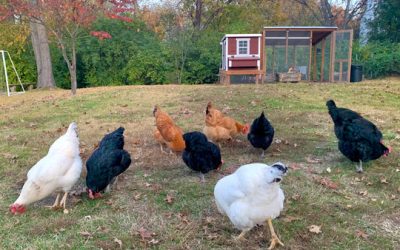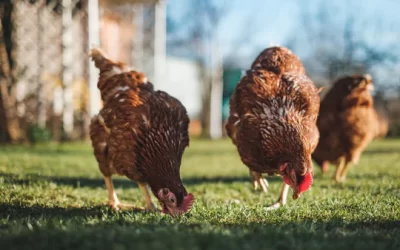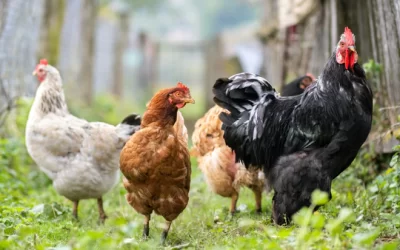With the winter months upon us, it is a good time to think about how you are keeping your chickens warm and comfy, even on days when the mercury hovers at or below zero. With the right preparation and a little extra effort, you can rest assured that your chicken flock is feeling nice and toasty. So let it snow, let it snow, let it snow!
Choose The Right Chicken Breeds For Your Climate
Different chicken breeds do best in different areas. Look for breeds that are cold tolerant, and leave the tropical breeds to our friends in the south. Generally, look for birds with dense feathers (natural insulation), and short combs and wattles (less chance for frostbite). Here are a few of our cold-weather favorites:

Icelandics
Originally from—you guessed it!—Iceland, these birds are extremely winter-hardy, docile, self-reliant, and great egg producers.

Rhode Island Reds
This popular American heritage breed hails from New England and can handle lots of snow. Additionally, they are exceptional egg layers.

Australorp
These all-black chickens come from Australia and are calm, friendly, and lay lovely brown eggs even during short winter days.

Plymouth Rock (or Barred Plymouth Rock)
Another New England native, this popular American breed lays all winter long and is famous for its black and white striped feathers.
Tips For Choosing The Right Chicken Coop
The coop you choose has a huge effect on your flock’s winter comfort.
Right Size
Think about Goldilocks. You do not want a tiny coop that will get crowded and dirty, but you also do not want one too big, either. The just-right coop will let the girls snuggle together for warmth, but also allow enough room for movement. We suggest at least 2 square feet per chicken in your coop. Chicken Coops Delivered has a variety of chicken coop sizes including the Coop in a Box, Small Chicken Coop, Medium Chicken Coop, Large Chicken Coop, XL Chicken Coop, and the Jumbo Chicken Coop. Ranging in capacity of 5 to 30 chickens.
Ventilation
Even though it might seem strange, air circulation will help your flock stay dry and cozy. Think about what happens when you shovel show in a big jacket and hat—you get all sweaty, right? Without ventilation, the natural moisture the chickens create will freeze and make them much colder than the wind blowing through ever would. A vent at the top of the coop is ideal for great air movement without wind hitting their little chicken faces head-on.
Deep Bedding
Try out the deep litter method, which is an old-time litter management trick. Start with a 3-4 inch layer of litter, and once a week add a new layer of litter on top of the chicken’s, ahem, moisture. You can turn the soiled litter yourself, or add some scratch to have the girls do it for you! The decomposing bedding will generate heat for the coop and at the end of the winter, you will have 8-12 inches of odorless compost for your garden.
Face South
If possible, point your coop southward to get the most light exposure you can. Chickens need at least 12 hours (14-16 is even better) of light a day to lay consistently. Take advantage of Mother Nature as much as you can, then supplement with lights—we suggest 24 watts per 40 square feet of coop.
Fresh Water For Chickens in Cold Weather
You already know that fresh, clean water is important for chickens. With winter’s subzero temperatures it is extra important that you take action to keep their water from freezing. You have two choices:
In The Coop
While you can keep your water in the coop, we do not recommend it. The water will make a big mess that will result in you spending more time replacing dirty water and cleaning out a mucky, muddy coop (in the cold).
Heated
We suggest using a heater water fountain. You can buy an entire heated fountain, or just add a de-icer to the feeder you already have. The important thing is to look for one that is thermostatically controlled, so it will kick on when the water gets too cold.
Keep The Chickens Active In Cold Weather
Just like your mom told you to run around when you were cold outside, getting those little chicken hearts pumping will keep them warm and happy.
Snow? No Problem!
Chickens are not too keen on walking on snow (neither am I if I am barefoot!), but if you lay down a layer of untreated hay on top of the snow, they will happily venture out and get their much-needed exercise.
Dinner Time
Even if you usually feed your flock in the morning, try to get the girls out and eating scratch in the evening. Scratch digests slower than regular feed so they will have the double benefit of getting out for exercise and the overnight heat the bird’s digestive system will create as it breaks down their dinner.
Insulating A Chicken Coop
We have found that if you follow the suggestions above unless you live in an extremely cold climate (we are talking multiple days/weeks below zero Fahrenheit), you probably will not need to add extra insulation to your coop. If you do, keep this in mind:
Chickens Eat Anything
Including insulation! Be sure to cover it up so they cannot peck at it and get sick.
Keep The Air Flowing
Even if you add insulation, you will still need to leave ventilation so the coop does not get stuffy and frozen.
Consider A Heat Lamp
Before adding insulation, try out a heat lamp with a thermostatically-controlled outlet. That way the heat will only kick in if the coop drops below a certain temperature and will turn off before it gets too hot.
With a plan and the right supplies, your flock will happily eat, lay, and thrive through the coldest of winters.
Check out our Chicken Coops and accessories that are guaranteed to keep your chickens warm and safe during winter!
RELATED ARTICLES
Beginner’s Guide To Raising Chickens
Recently, there has been a growing focus on local food and sustainability. Which has spurred a renewed interest in raising chickens, especially in larger cities. Depending on the purpose your chickens will serve whether that be for meat, eggs, or to have them as...
What Herbs Are Good For Chickens?
Whether you are just starting out with your first flock or you have been raising chickens for years, it is always necessary to know what your chickens can and can't eat. Ensuring your chickens get the nutrition and variety they need is important. Chickens need a...
Best Chicken Breeds For Beginners
Choosing the Right BreedChoosing a chicken breed is important for a variety of reasons. The chicken breed you choose ultimately depends on the purpose your chicken will serve. That could be for meat, eggs, or to have them as pets. Certain breeds are better for egg...




